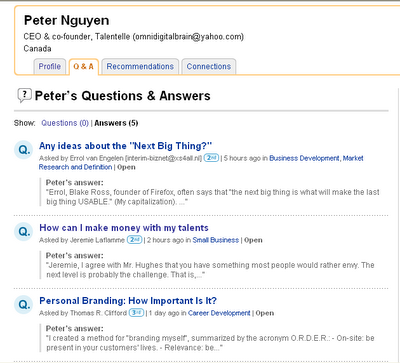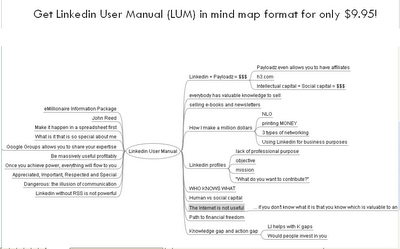Linkedin and bathroom stall walls
Someone posted an interesting question, which might reflect how many people feel about the overtly public aspect of Linkedin user information. My answer below.
Question:
I was at a networking event yesterday and as usual was trading business cards and finding out if the other person was on LinkedIn or not. Most were and those that weren't (except for one) asked me to send them an invite. That one person firmly had the impression that joining LinkedIn reminded them of putting their name and phone number on the bathroom stall wall. I am interested in how you would have responded to that impression. Thanks.
Answer:
Well, Linkedin is interactive, so when you post something (such as on this Q&A board), people can respond to you. If you write a message on the bathroom stall wall, you usually do not expect a written, thoughtful reply. Nobody ever goes, "Wait, I gotta go to the bathroom and check my messages!" But seriously, beyond the interactivity, there is also the legitimate credibility or transparency: most people can see your profile, and also WHERE you work. This should reassure people, especially women since in their case, there is the security issue which is rightly at the top of their minds. Thanks for posting this question, it raises a lot of important issues!
Question:
I was at a networking event yesterday and as usual was trading business cards and finding out if the other person was on LinkedIn or not. Most were and those that weren't (except for one) asked me to send them an invite. That one person firmly had the impression that joining LinkedIn reminded them of putting their name and phone number on the bathroom stall wall. I am interested in how you would have responded to that impression. Thanks.
Answer:
Well, Linkedin is interactive, so when you post something (such as on this Q&A board), people can respond to you. If you write a message on the bathroom stall wall, you usually do not expect a written, thoughtful reply. Nobody ever goes, "Wait, I gotta go to the bathroom and check my messages!" But seriously, beyond the interactivity, there is also the legitimate credibility or transparency: most people can see your profile, and also WHERE you work. This should reassure people, especially women since in their case, there is the security issue which is rightly at the top of their minds. Thanks for posting this question, it raises a lot of important issues!





